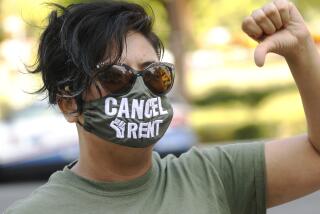N.Y.’s Tough Anti-Smoking Law: No Ifs, Ands or Butts
- Share via
The Big Apple went a long way toward kicking the cigarette habit as the city’s anti-smoking law took effect. New York City Mayor Edward I. Koch helped City Health Commissioner Dr. Stephen Joseph post a no-smoking sign at Tapis Rouge, a French bistro. “We’re protecting the health of the people of the city of New York,” Koch said. The Clean Indoor Air Act limits or bans smoking in most enclosed public areas, including taxicabs, restaurants and workplaces. One man who was not happy with the law was accountant David Knight, who was interviewed on 42nd Street shortly before noon, puffing on a cigarette. “I haven’t dared to go to work yet,” he said. “I do tax returns and it’s incredible pressure. I smoke three packs a day and I know I can’t do it without smoking.”
--The agenda seemed like business as usual at the Carmel City Council meeting. The council dealt with such routine matters as banning skateboarding on a popular street. The meeting was special, nonetheless, because it was the last one Clint Eastwood would conduct as mayor. The actor announced in February that he would not run for a second term. A successor will be elected Tuesday and Eastwood will relinquish his post April 19. “I’ve enjoyed it very much,” he said. “I wouldn’t trade the last two years for anything.” Eastwood said his decision not to seek another term was due to the desire to spend more time with his son and daughter. He has not ruled out the possibility of re-entering elective politics at a later date. Eastwood is currently working on a new Dirty Harry film--”The Dead Pool.”
--An anonymous Briton paid a record $160,000 to become lord of William Shakespeare’s birthplace, Stratford-upon-Avon. “He was particularly interested in this one because of its Shakespearean connections,” said the buyer’s agent after the bidding at London’s Strutt & Parker auctioneers. The agent would not disclose his client’s identity, saying he was “a gentleman who holds a number of other titles.” Paying the highest price ever since the sale of British titles started in 1981, the buyer won the right to call himself “Lord of the Manor” on his stationery and passport. The lordship does not include any property.
More to Read
Sign up for Essential California
The most important California stories and recommendations in your inbox every morning.
You may occasionally receive promotional content from the Los Angeles Times.













